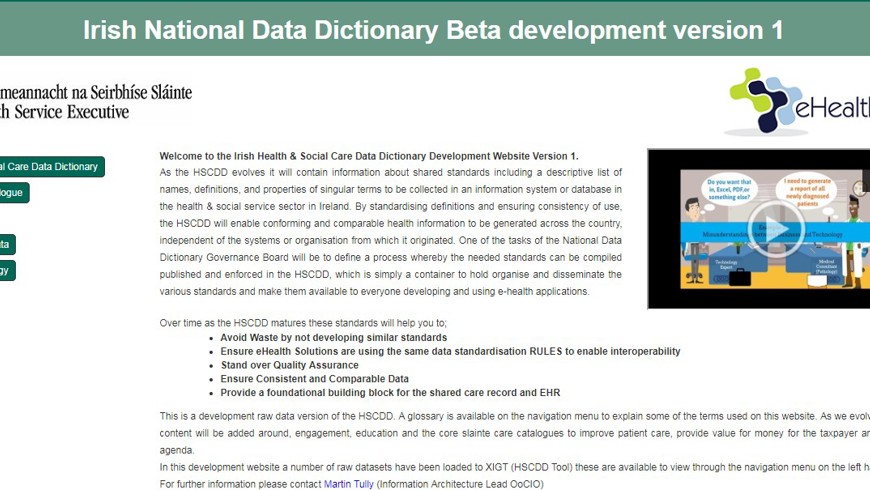
HSE’s data dictionary toolkit brings benefits for staff

Screenshot of the HSE's Irish National Data Dictionary
The HSE’s Office of the Chief Information Officer is developing a data dictionary for all national health and social care data in Ireland. A data dictionary forms the basis of information integrity. It acts as a single source of truth for health data and provides an assured reference point for approved data definitions. Dictionaries for data are useful to describe the ‘rules’ by which all the data in a particular system need to abide by.
The office of the HSE CIO has developed a ‘toolkit’ to support the standardisation of data, which will help ensure that all staff in the Irish health service have access to agreed standard definitions for medical and health service terms. This will support interoperability and integrated care.
The resulting ‘data dictionary’ will be a ‘point of truth’ list for key health service terms and concepts including agreed definitions and protocols. Like all good dictionaries it will develop and evolve over time and additional terms, concepts and metrics will be added in the future.
Information Architecture Lead in the HSE’s Office of the Chief Information Officer Martin Tully explains some of the benefits: ‘‘Our goals are to ensure that every member of staff will be able to access the data dictionary and use it to ensure they have the same understanding of relevant health service terms. We also want to ensure that it supports interoperability and integrated care by acting as a signposting reference point for messaging and clinical standards.

Information Architecture Lead in the HSE’s Office of the Chief Information Officer Martin Tully explains some of the benefits of the HSE's Data Dictionary
Historically ICT systems have been implemented on a standalone basis
Welcoming the development, National Fellow for Innovation and Change with National Doctors Training and Planning 2018-2019, Dr Christine Kiernan said: "The development of the Data Dictionary is fantastic progress in healthcare. It will not only facilitate implementation of best practice, quality improvement and enhanced education for healthcare staff but will also facilitate the development of the National Electronic Health Record. By using and implementing standardised definitions research will be facilitated driving improvements in our healthcare service and enhancing patient care."
Historically ICT systems have been implemented on a standalone basis with no information sharing capability across these siloed systems. This impacts on data quality with different interpretations of data elements and definitions leading to poorer decisions and poorer planning based on inaccurate information.
The data dictionary initiative will help to ensure that the same terms are consistently interpreted and have the same meaning when used by different teams and individuals across the health system.
‘‘For patients this standardised approach will mean the right information will be available in the right place at the right time. It’s going to be very useful for patients to have standardised definitions of things like allergies, alerts and blood pressure. We are also working with the National Dementia Office", Martin Tully added.
Peter Connolly, Head of Enterprise Architecture in the HSE said: ‘‘ For each data element the dictionary can provide a list of information describing the field where the data originates, any rules or edits that apply to it and a description of any codes applied to the data element such as ICD or Snomed where applicable.”
All of this foundational work will ensure consistency of definitions across the Health Service. It is also going to benefit patients in the longer term as the ICT systems underlying health care will be communicating to each other in a standardised language. This will greatly facilitate population health research and interoperability.
Further information
Further information on the Data Dictionary is available from Martin Tully, Head of Information Architecture in the office of the CIO at martin.tully@hse.ie or from nhscdd@hse.ie
or Click Here to view the Data Dictionary
